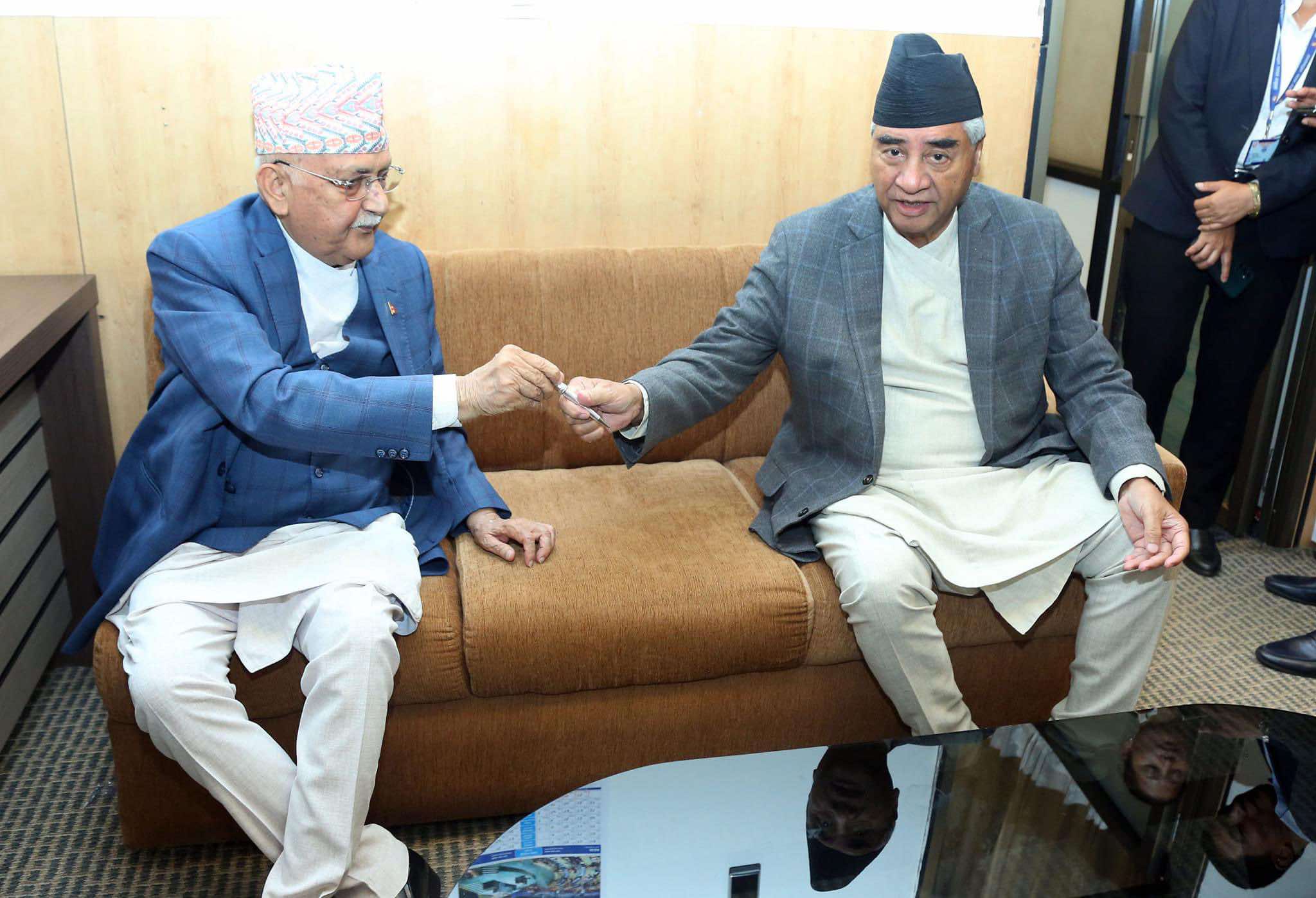

KATHMANDU: Tensions between the ruling Nepali Congress (NC) and the CPN-UML have intensified as Prime Minister KP Sharma Oli prepares for his upcoming visit to China.
Disagreements over the implementation of the Belt and Road Initiative (BRI) have deepened the divide between the two parties.
Over Tuesday and Wednesday, Prime Minister Oli held extended talks with Nepali Congress President Sher Bahadur Deuba regarding the BRI and his agenda for the China trip. However, the discussions ended without a resolution.
Sources from the Prime Minister’s Office indicate that PM Oli remains determined to push forward with the BRI, despite mounting opposition from the Nepali Congress.
This rift could escalate into a significant internal issue within the government.
PM Oli’s official visit to China, set for December 2, is expected to focus on securing an agreement for BRI projects.
However, the ruling coalition is divided, with the Nepali Congress rejecting the idea of implementing the BRI through loans.
During a meeting on Tuesday with top leaders from both parties to finalize the visit’s agenda, a heated debate erupted over the government’s approach to the BRI.
Nepali Congress General Secretary Gagan Thapa argued that Nepal should first focus on fulfilling past agreements with China, particularly those involving grant assistance, before committing to new projects.
When Deuba echoed this sentiment, emphasizing the need to prioritize grants over BRI loans, Prime Minister Oli responded, questioning the purpose of his trip if no agreement on BRI implementation was to be signed.
Deuba countered by suggesting that Oli negotiate for subsidies rather than loans for BRI projects.
PM Oli, on the other hand, argued that advancing the BRI would help strengthen Nepal’s position to renegotiate existing Chinese loans, such as converting the Pokhara airport loan into a grant.
Speaking at a separate event in Kathmandu on Wednesday, Thapa acknowledged the growing differences between the two parties.
He reiterated Nepali Congress’s firm opposition to BRI loans and emphasized completing past agreements through grant aid.
Sources in Baluwatar suggest that Deuba and Thapa have advocated for focusing on the grants promised by Chinese President Xi Jinping during his 2019 visit, which remain largely unutilized due to pandemic-related delays.
Leaders from the UML, including Oli’s political advisor Bishnu Rimal and Finance Minister Bishnu Paudel, participated in Tuesday’s meeting.
A source close to Baluwatar indicated that Nepali Congress leaders are particularly concerned about the risk of Nepal falling into a “Chinese debt trap” and have urged the government to seek subsidies or grants rather than loans for development projects.
As the Prime Minister’s visit approaches, the deepening rift poses challenges to finalizing Nepal’s position on the BRI.
PM Oli’s push for the initiative contrasts with Congress’s insistence on prioritizing grants and honoring previous commitments.
This division highlights the fragile nature of the coalition and raises questions about the government’s future stability if no compromise is reached.
The Chinese Embassy in Kathmandu has been actively lobbying for the BRI’s implementation in Nepal, with intensified efforts directed towards leaders in both the Nepali Congress and UML.
However, many senior Nepali Congress figures remain wary of the BRI project and are reluctant to give Oli free rein to advance its implementation during this visit.
Pressure is mounting on Deuba as resistance within the Nepali Congress grows.
China has proposed supporting at least four projects under the BRI during PM Oli’s trip, including the Tokha-Khare Tunnel, the Rasuwagadhi-Kathmandu road upgrade, a dry port at Korla, and a hydropower project.
Beijing has urged Nepal to sign an implementation agreement for these projects, and Oli’s team has conveyed that the cabinet will endorse the plan this week.
Senior Congress leaders are meeting with Deuba, urging him to avoid supporting the BRI during Oli’s visit.
Many Nepali Congress leaders remain skeptical of the BRI’s motivations, particularly regarding China’s push for left-wing unity in Nepal.
While Prime Minister Oli favors both project grants and concessional loans under the BRI, growing resistance within the Nepali Congress party has made Deuba hesitant to back Oli’s stance.
Nepali Congress leaders fear that any missteps during the visit could damage the party’s position and its ideological integrity, particularly regarding relations with India and the West.